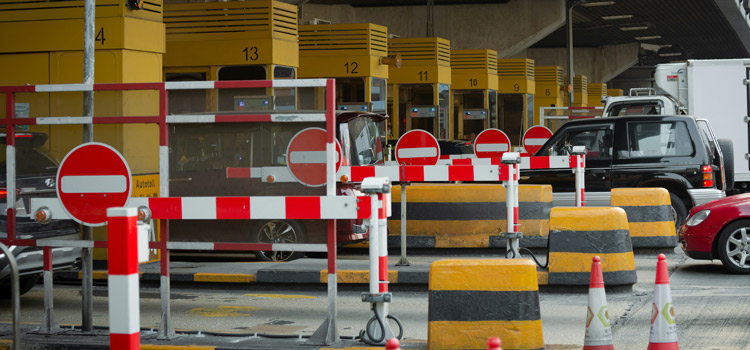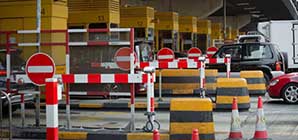Navigating Toll Taxes and Toll Plaza: Costs, Benefits and Key Considerations
Posted On : April 27, 2024

Table of Contents
Introduction
A toll tax is a usage charge for cars utilizing specific highways or bridges. Usually, a designated toll booth or plaza is where toll taxes are collected. These roads and bridges require maintenance and operation costs to be paid for out of the money collected from toll taxes. Toll taxes do not apply to some vehicles, though, including fire trucks, police cars, ambulances, and so on.
What is Toll Tax?
The National Highway Authority of India (NHAI) levies toll taxes. Tolls are one way to raise money for infrastructure upkeep and repairs. Among the factors influencing the toll tax rate are the type of vehicle, the distance traveled, and the time of day. The regulations are determined by the NHAI and are subject to modification depending on the kind of road and specific toll booth. By paying tolls, drivers help maintain and repair these essential pieces of infrastructure.
Features of Toll Tax
Some of the features of Toll Tax are provided below;
- Toll taxes are imposed on both products and people as an indirect tax.
- The money collected from toll taxes is used by state-sponsored agencies to construct new highways and maintain existing ones.
- Toll tax is collected at toll booths that issue payment receipts.
- The NHAI divides toll tax money among a number of contractors or private companies in charge of maintaining a certain road segment.
- Toll plaza maintenance is the responsibility of private organizations who handle drinking water, fire safety, sanitation, restrooms, and other small details.
Collection of Toll Tax
The toll tax amounts are not fixed and change based on the vehicle's size and carriage weight. The vehicle's intended usage, whether for business or pleasure, is also taken into account when calculating the toll tax.
The damage that large cars inflict on a highway is taken into consideration by the NHAI when determining the toll rate. Thus, the load capacity of a toll tax is an important consideration. The size of the vehicle also affects the Passenger Car Unit, which sets the toll price.
Toll Tax Rules
Some of the most significant laws and guidelines pertaining to toll taxes are listed below:
- A fair and reasonable toll should be imposed on all users. Prices should be determined by the type of car, the distance traveled, and the time of day. Regular reviews are necessary to ensure that toll prices remain equal and fair.
- The placement of toll plazas must be such that they do not cause excessive traffic or safety risks. The location of a toll plaza should take traffic congestion, security, and environmental effects into account.
- Vehicles used for emergency response, military service, and public transit may not be subject to toll fees. Additionally, discounts could be given to locals or repeat consumers.
- There are a number of ways to collect toll tax, such as using cash or electronic toll collection systems. Toll booths must be equipped with the technologies required to securely and efficiently collect toll taxes.
Advantages of toll taxes
These are toll tax's main characteristics and advantages:
- The government receives a large portion of its funding from tolls, which can be utilized for associated operations such as road maintenance and repair and development initiatives.
- Road markings, lighting, and signage upgrades can all lower the frequency of traffic accidents and fatalities and can be paid for using toll money.
- Toll taxation can help reduce the environmental impact of road traffic by encouraging carpooling and public transport through toll reductions.
Conclusion
Tolls offer an impartial and effective method of generating funds for new road construction and maintenance, providing dependable and safe transport for all road users. Along with paying your toll, managing your other personal expenses is also important. For more information on toll taxes contact the lawyers near your area.
FAQs
- What are the rules of toll tax in India?
The National Highways Authority of India (NHAI) states that using FASTags is required. Since February 2021, all private and commercial cars must abide with the rule. The toll price will be increased in accordance with the new FASTag regulations NHAI if the FASTag is not accepted at the toll plaza. - What is 10 second rule in toll plaza?
When it takes longer than 10 seconds to get to the toll booth or when there is a waiting list longer than 100 metres, cars are not required to pay a toll at toll plazas as set forth by the National Highways Authority of India (NHAI). - Which vehicles are exempted from toll tax?
Government cars, emergency vehicles such as ambulances and fire department vehicles, and VIP convoys are exempt from toll taxes in India. In addition, some CNG and electric vehicles, as well as police and military vehicles used for official purposes, would not be required to pay toll charges, depending on state and local laws. - Is toll tax free for local residents?
Yes, if a car owner lives 20 kilometers or fewer from a toll plaza on a national highway, they are eligible to apply for a toll tax relief. They have to present the vehicle's Registration Certificate (RC) and legitimate evidence of address.























